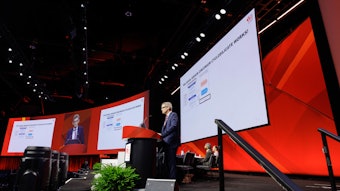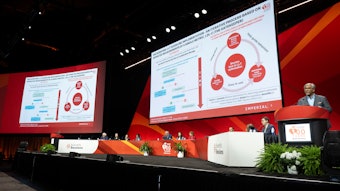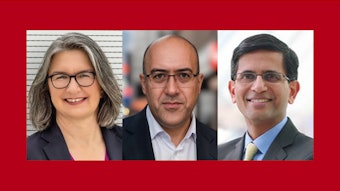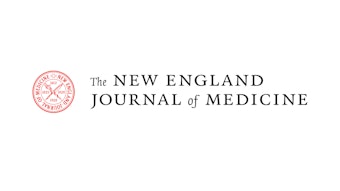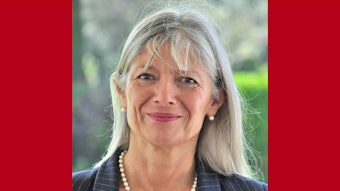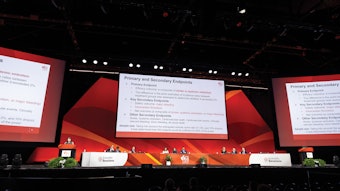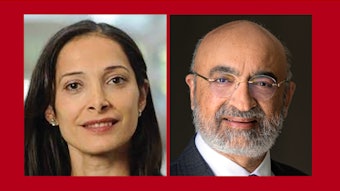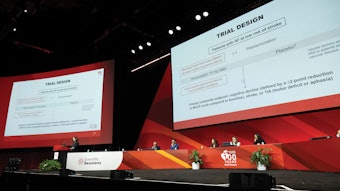AHA selects six Distinguished Scientists for 2024
The American Heart Association is honoring six professional members with its Distinguished Scientist award for extraordinary contributions to cardiovascular and stroke research. Following are the 2024 awardees.

Robert O. Bonow, MD, MS, FAHA
Northwestern University | Feinberg School of Medicine
Chicago
Robert O. Bonow is the Goldberg Distinguished Professor of Cardiology at the Northwestern University Feinberg School of Medicine. He was senior investigator and deputy chief of the cardiology branch of the National Heart, Lung, and Blood Institute at the National Institutes of Health from 1980 to 1992 and was chief of the division of cardiology at Northwestern University Feinberg School of Medicine from 1992 to 2011.
His research focuses on the application of cardiovascular imaging to investigate the natural history and clinical outcomes of people with valvular heart disease, hypertrophic cardiomyopathy and ischemic left ventricular dysfunction. He has been author or co-author of over 650 papers in the medical literature and 120 book chapters.
He is editor-in-chief of JAMA Cardiology and an editor of Braunwald’s Heart Disease: A Textbook of Cardiovascular Medicine.
Bonow has served on the Board of Scientific Counselors and Board of Extramural Advisors of the NHLBI and the Subspecialty Board on Cardiovascular Disease of the American Board of Internal Medicine. He is a past president of the American Heart Association, a Master of the American College of Cardiology and a Master of the American College of Physicians.
Among his honors are the NIH Director’s Award and the U.S. Public Health Service Commendation Medal and Outstanding Service Medal. He is a recipient of the Distinguished Leadership Award, Distinguished Achievement Award, Gold Heart Award and James B. Herrick Award of the AHA; the Distinguished Fellowship Award, Distinguished Service Award and Distinguished Scientist Award of the American College of Cardiology; and the John Phillips Memorial Award of the American College of Physicians.
Pedro J. del Nido, MD, FAHA
Boston Children’s Hospital
Pedro J. del Nido has been at the forefront of myocardial preservation and more recently has focused on creating reconstructive techniques for complex congenital heart defects. Recognizing a large unmet need, del Nido has worked to develop cardiac medical devices designed for growing children. This effort has led to a novel growth-accommodating heart valve that is now in clinical trials.
Del Nido was born in Santiago, Chile, and immigrated to the United States at age 10. He attended undergraduate and medical school at the University of Wisconsin-Madison. He completed a general surgery internship and residency at Boston University and entered cardiothoracic residency at the University of Toronto.
Before starting his clinical training, he spent a year in the laboratory at the Banting Institute of the University of Toronto, where he began his work on myocardial preservation. That research focus continued through his residency and early career in congenital cardiac surgery. Del Nido spent an additional year as a clinical fellow at the Hospital for Sick Children in Toronto.
He started his career at the University of Illinois Chicago then moved to the University of Pittsburgh, where he developed a solution to preserve the heart during prolonged heart surgery. This solution, now known as “del Nido cardioplegia,” is one of the most widely used cardioplegia formulations around the world.
In 1994, del Nido joined the faculty at Boston Children’s Hospital and Harvard Medical School. He rose to the rank of professor of surgery and in 2004, he was named William E. Ladd Professor of Child Surgery at Harvard Medical School and cardiac surgeon-in-chief at Boston Children’s.
Del Nido has received NIH funding throughout his career. He has over 500 peer-reviewed publications and more than 50 awarded and pending patents.
Jiang He, MD, PhD, MSc, FAHA
Tulane University
New Orleans
Jiang He is an internationally renowned scientist in epidemiological, clinical and translational research in cardiometabolic diseases. He has been principal investigator and co-investigator for more than 50 major NIH research awards and has been an author of more than 750 scientific articles published in top-tier biomedical journals.
He has led landmark studies that have documented:
• Cardiovascular disease and cancer as the leading causes of death, with hypertension and cigarette smoking as the primary preventable risk factors for premature death in China.
• The rapid acceleration of the global burden of obesity and diabetes, accompanied by large global disparities in hypertension.
• The increased risk of cardiovascular disease and all-cause mortality associated with high sodium intake in people with obesity or chronic kidney disease.
• The safety of early antihypertensive treatment in people with acute ischemic stroke.
• The effectiveness of an intervention led by community health workers to lower blood pressure, improve hypertension control and significantly reduce cardiovascular events, all-cause dementia and total mortality. These study findings contribute to cardiometabolic disease prevention in resource-constrained populations globally.
He is a dedicated educator who has mentored more than 100 master’s students and more than 50 doctoral students and postdoctoral fellows. He has also mentored over 20 junior faculty investigators, many of whom have developed successful research careers and become leaders in their fields.
He has received numerous awards from local, national and international academic institutions and professional societies, including the Distinguished Alumnus Award from Johns Hopkins University, Research Hall of Fame induction from Tulane University, the Detlev Ganten Excellence Award in Hypertension and Global Health Implementation from the World Hypertension League, and the Abraham Lilienfeld Award from the American College of Epidemiology. In 2023, He was elected to the National Academy of Medicine for transforming cardiovascular disease prevention efforts worldwide.
Debra K. Moser, PhD, RN, FAHA
University of Kentucky
Lexington, Kentucky
Debra K. Moser is a professor at the University of Tennessee, and professor and Linda C. Gill Chair of Cardiovascular Nursing at the University of Kentucky. She is director of the Research and Interventions for Cardiovascular Health (RICH) Heart Program, an international research collaborative dedicated to cardiovascular research and mentorship. She is also an editor of the Journal of Cardiovascular Nursing. Her research program focuses on intervention research and testing biobehavioral self-care interventions in populations with notable health disparities, including rural residents, caregivers and other vulnerable people with cardiovascular disease and heart failure to improve quality of life, morbidity and mortality.
She also studies cardiovascular risk reduction in rural residents at high risk for CVD and heart failure. Examining the impact of depressive symptoms on outcomes is an underpinning of all her work.
Moser’s work has been recognized with more than 30 awards, including the HFSA Lifetime Achievement Award, the Dracup mentorship, Lembright as well as Heart Failure Research awards from the American Heart Association. She has been recognized with the President’s Research Award from Friends of the National Institute of Nursing Research.
She is a fellow of the American Academy of Nursing, the AHA and the Preventive Cardiovascular Nurses Association. Her funding from the National Institutes of Health and the Patient-Centered Outcomes Research Institute exceeds $40 million. She has published more than 450 data-based journal articles, 25 chapters and three books.
Jane W. Newburger, MD, MPH, FAHA
Harvard Medical School
Boston
Jane W. Newburger is the Commonwealth Professor of Pediatrics at Harvard Medical School and associate cardiologist-in-chief for academic affairs at Boston Children’s Hospital. An international authority in pediatric cardiovascular disease, Newburger has focused her research on clinical outcomes and neurodevelopment in congenital heart disease, Kawasaki disease and the multisystem inflammatory syndrome in children.
She has published over 600 peer-reviewed manuscripts, reviews and chapters. She is a member of the National Academy of Medicine and has received the Distinguished Scientist Award (Clinical) of the American College of Cardiology, the Clinical Research Prize of the American Heart Association, the AHA Young Hearts Meritorious Achievement Award, the AHA Paul Dudley White Award and the Helen Taussig Founders Award of the American Academy of Pediatrics.
Newburger has served on the National Heart, Lung, and Blood Institute Advisory Council, leadership councils in the AAP, ACC and AHA, and the board of trustees of the ACC. She previously chaired the Clinical Science Subcommittee of the NHLBI Task Force on Pediatric Cardiovascular Disease and the AHA Rheumatic Fever, Endocarditis and Kawasaki Disease Committee.
She is a former associate editor and then senior editor of the AHA’s flagship journal, Circulation, and currently serves on an array of journal editorial boards. She has mentored generations of trainees and junior faculty; is a longstanding PI of a T32 award in pediatric cardiovascular research; and received both the Harvard Medical School’s William Silen Lifetime Achievement in Mentoring Award and the Joseph B. Martin Dean’s Leadership Award for the Advancement of Women Faculty.
Newburger has been continuously funded by the National Institutes of Health since 1982. Her weighted Relative Citation Ratio is 2250, and she has 33 published manuscripts above the 99th NIH percentile for citation.
She also maintains a busy clinical practice comprising patients with congenital and acquired heart disease, keeping her grounded regarding important issues affecting the well-being of children with heart disease.
Stephen G. Young, MD, FAHA
University of California, Los Angeles
Stephen G. Young is an American physician-scientist known for investigating the genetics and molecular physiology of apolipoprotein B, the intravascular processing of triglyceride-rich lipoproteins by lipoprotein lipase, and the role of nuclear lamins in health and disease.
Young is a distinguished professor of medicine and human genetics at UCLA, where he has worked closely with two faculty colleagues (Loren G. Fong, PhD, and Anne P. Beigneux, PhD). Young defined the first APOB mutations causing familial hypobetalipoproteinemia. He discovered that GPIHBP1, a protein of capillary endothelial cells, is crucial for the lipolytic processing of triglyceride-rich lipoproteins. GPIHBP1 captures LPL from within the interstitial spaces (where it is secreted by myocytes) and shuttles it across endothelial cells to its site of action within the capillary lumen. In the absence of GPIHBP1, LPL is stranded within the interstitial spaces, resulting in markedly impaired intravascular triglyceride hydrolysis and severe hypertriglyceridemia.
He also demonstrated that hypertriglyceridemia in the setting of APOA5 deficiency is caused by reduced amounts of LPL inside capillaries. APOA5 suppresses the ability of the ANGPTL3/ANGPTL8 complex to detach LPL from its binding sites within capillaries.
Young studied the history of science at Princeton University and earned a medical degree from Washington University in St. Louis. He trained in internal medicine at the University of California, San Francisco, and cardiovascular diseases at the University of California, San Diego. He is board-certified in both disciplines.
He is a member of the National Academy of Sciences, the American Society for Clinical Investigation and the Association of American Physicians. He is a corresponding member abroad of the Austrian Academy of Sciences and was named an inaugural fellow of the American Society for Biochemistry and Molecular Biology. He has received a Jung Prize in Medicine and an honorary doctorate in medicine from the University of Gothenburg in Sweden.
Visit professional.heart.org/en/meetings/scientific-sessions/awards for Council award recognition.


